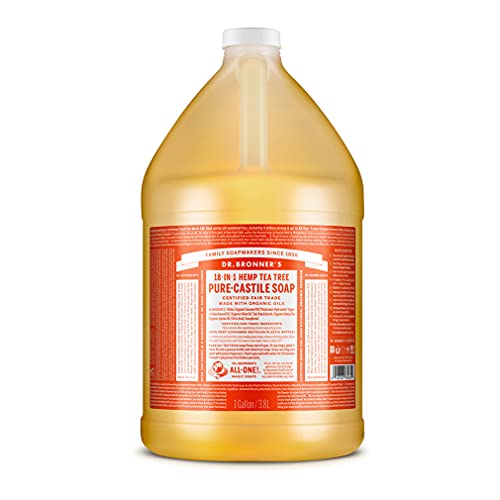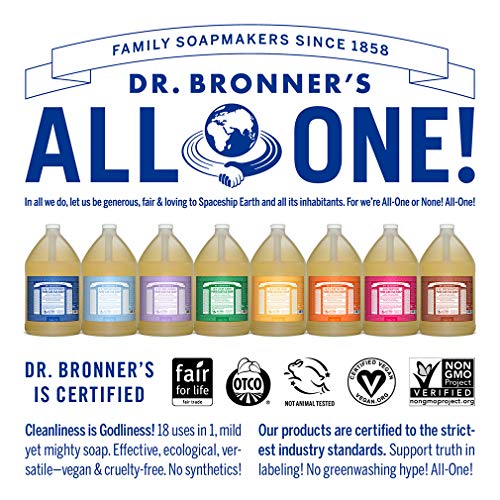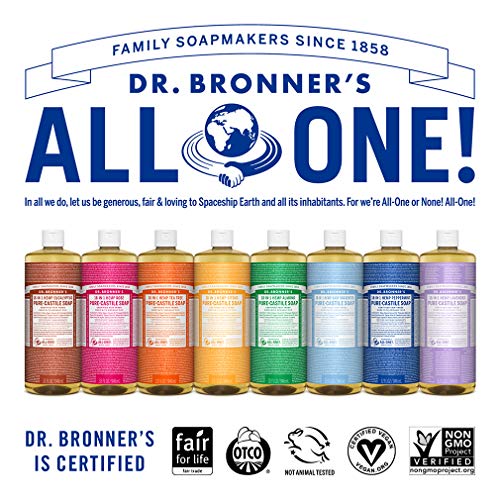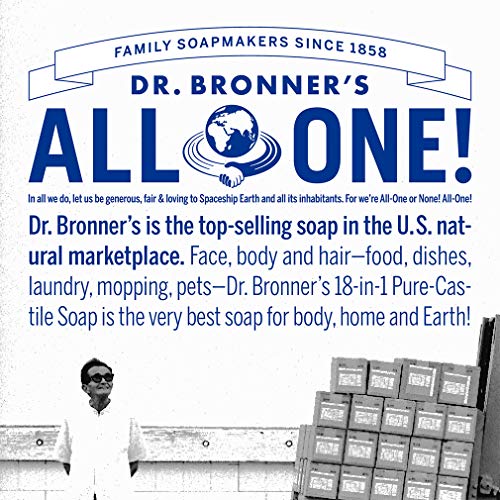





Dr. Bronner's Pure-Castile Liquid Soap - Organic Oils for Acne, Dandruff, and More - 1 Gallon


Citric Acid
Medium RiskCitric acid is an alpha hydroxy acid used in personal care products primarily for its role as a pH adjuster and natural preservative. It occurs naturally in citrus fruits and is commonly utilized in various formulations for its chelating properties and mild exfoliation benefits.
Sustai Insights
Citric acid offers functional benefits as an effective preservative and pH stabilizer, contributing to product longevity and stability. It is biodegradable and derived from renewable sources. Health risks are low, with minimal concerns regarding carcinogenicity, allergies, and reproductive toxicity. However, moderate use restrictions exist due to potential irritation at high concentrations. Environmental risks are limited, as citric acid is not known to accumulate in ecosystems. Regulatory agencies have no significant advisories against its use. Overall, it is assessed as a medium-risk ingredient, with safe usage practices recommended and alternatives available.
Vegetarian Glycerin
Low RiskVegetarian glycerin, also known as glycerol, is a colorless, odorless, and viscous liquid derived from plant sources. It is primarily used as a humectant, solvent, and emollient in various personal care products, helping to retain moisture and improve texture.
Sustai Insights
Vegetarian glycerin offers functional benefits as an effective humectant, promoting hydration and skin smoothness. It is biodegradable and typically sustainably sourced. Health risks associated with glycerin are low, with no significant concerns for carcinogenicity, allergens, or reproductive toxicity. Environmental risks are minimal, and it is not subject to major regulatory warnings. Overall, the risk level for this ingredient is low, making it a safe choice in formulations. Safe usage practices include ensuring proper concentrations in products, and alternatives such as propylene glycol exist but may have differing properties.
Water
Low RiskWater is a clear, colorless liquid essential for various biological processes. It serves as a solvent in formulations, facilitating the dissolution of other ingredients and enhancing product texture and application. Additionally, water plays a crucial role in hydration and is a key component in many cosmetic and personal care products.
Sustai Insights
Water is an effective solvent and hydrator, contributing to the texture and efficacy of formulations. It is biodegradable and generally regarded as safe, with low concerns regarding carcinogenicity, allergies, and reproductive toxicity. However, excessive water usage can lead to environmental concerns, particularly regarding resource depletion. Regulatory bodies do not impose restrictions on water use in cosmetics. Overall, the risks associated with water are low, making it a safe and essential ingredient.
Melaleuca Alternifolia (Tea Tree)
Low RiskMelaleuca alternifolia, commonly known as tea tree, is an unspecified preparation derived from the leaves of the tea tree. It is primarily used for its antiseptic properties and is found in various personal care products.
Sustai Insights
Tea tree oil offers functional benefits such as antimicrobial properties, making it effective in skincare formulations. It is considered to have low health risks, including low concerns for carcinogenicity, allergies, and reproductive toxicity. Environmental risks are minimal, with no significant pollutant or bioaccumulation potential. Regulatory bodies have noted no major advisories, and overall risk assessment remains low. For safe usage, it is recommended to use appropriate concentrations and consider alternatives like lavender or eucalyptus oil for similar benefits.
Simmondsia Chinensis (Jojoba)
Low RiskSimmondsia chinensis, commonly known as jojoba, is an oil derived from the seeds of the jojoba plant. It is commonly used in cosmetic formulations for its moisturizing properties, acting as an emollient and skin conditioning agent.
Sustai Insights
Jojoba oil offers functional benefits such as effective skin moisturization and is biodegradable, with sustainable sourcing practices. Health risks are low, with minimal concerns regarding carcinogenicity, allergies, and reproductive toxicity. Environmental impact is negligible, with no pollutant or bioaccumulation potential. Regulatory status is favorable with no significant restrictions noted. Overall, it is assessed as low risk, and safe usage practices should be maintained. Alternatives include other plant-derived oils like argan or almond oil, which may provide similar benefits.
Tocopherol, D Alpha
Low RiskTocopherol, specifically d-alpha tocopherol, is a naturally occurring form of Vitamin E. It is commonly used in cosmetic and personal care products primarily for its antioxidant properties, helping to protect formulations from oxidation and extend shelf life.
Sustai Insights
D-alpha tocopherol provides effective antioxidant benefits, contributing to product stability. It is sustainably sourced and generally regarded as safe, with low concerns regarding carcinogenicity, allergies, and reproductive toxicity. However, there are minor concerns about endocrine disruption. Regulatory bodies have not imposed significant restrictions, indicating low overall risk. Recommended usage practices include adhering to established safe concentration thresholds. Alternatives, such as other forms of Vitamin E or plant-based antioxidants, may also be considered.
Vegetarian Glycerin
Low RiskVegetarian glycerin, also known as glycerol, is a colorless, odorless, and viscous liquid derived from plant sources. It is primarily used as a humectant, solvent, and emollient in various personal care products, helping to retain moisture and improve texture.
Sustai Insights
Vegetarian glycerin offers functional benefits as an effective humectant, promoting hydration and skin smoothness. It is biodegradable and typically sustainably sourced. Health risks associated with glycerin are low, with no significant concerns for carcinogenicity, allergens, or reproductive toxicity. Environmental risks are minimal, and it is not subject to major regulatory warnings. Overall, the risk level for this ingredient is low, making it a safe choice in formulations. Safe usage practices include ensuring proper concentrations in products, and alternatives such as propylene glycol exist but may have differing properties.
Water
Low RiskWater is a clear, colorless liquid essential for various biological processes. It serves as a solvent in formulations, facilitating the dissolution of other ingredients and enhancing product texture and application. Additionally, water plays a crucial role in hydration and is a key component in many cosmetic and personal care products.
Sustai Insights
Water is an effective solvent and hydrator, contributing to the texture and efficacy of formulations. It is biodegradable and generally regarded as safe, with low concerns regarding carcinogenicity, allergies, and reproductive toxicity. However, excessive water usage can lead to environmental concerns, particularly regarding resource depletion. Regulatory bodies do not impose restrictions on water use in cosmetics. Overall, the risks associated with water are low, making it a safe and essential ingredient.
Citric Acid
Medium RiskCitric acid is an alpha hydroxy acid used in personal care products primarily for its role as a pH adjuster and natural preservative. It occurs naturally in citrus fruits and is commonly utilized in various formulations for its chelating properties and mild exfoliation benefits.
Sustai Insights
Citric acid offers functional benefits as an effective preservative and pH stabilizer, contributing to product longevity and stability. It is biodegradable and derived from renewable sources. Health risks are low, with minimal concerns regarding carcinogenicity, allergies, and reproductive toxicity. However, moderate use restrictions exist due to potential irritation at high concentrations. Environmental risks are limited, as citric acid is not known to accumulate in ecosystems. Regulatory agencies have no significant advisories against its use. Overall, it is assessed as a medium-risk ingredient, with safe usage practices recommended and alternatives available.
Melaleuca Alternifolia (Tea Tree)
Low RiskMelaleuca alternifolia, commonly known as tea tree, is an unspecified preparation derived from the leaves of the tea tree. It is primarily used for its antiseptic properties and is found in various personal care products.
Sustai Insights
Tea tree oil offers functional benefits such as antimicrobial properties, making it effective in skincare formulations. It is considered to have low health risks, including low concerns for carcinogenicity, allergies, and reproductive toxicity. Environmental risks are minimal, with no significant pollutant or bioaccumulation potential. Regulatory bodies have noted no major advisories, and overall risk assessment remains low. For safe usage, it is recommended to use appropriate concentrations and consider alternatives like lavender or eucalyptus oil for similar benefits.
Simmondsia Chinensis (Jojoba)
Low RiskSimmondsia chinensis, commonly known as jojoba, is an oil derived from the seeds of the jojoba plant. It is commonly used in cosmetic formulations for its moisturizing properties, acting as an emollient and skin conditioning agent.
Sustai Insights
Jojoba oil offers functional benefits such as effective skin moisturization and is biodegradable, with sustainable sourcing practices. Health risks are low, with minimal concerns regarding carcinogenicity, allergies, and reproductive toxicity. Environmental impact is negligible, with no pollutant or bioaccumulation potential. Regulatory status is favorable with no significant restrictions noted. Overall, it is assessed as low risk, and safe usage practices should be maintained. Alternatives include other plant-derived oils like argan or almond oil, which may provide similar benefits.
Tocopherol, D Alpha
Low RiskTocopherol, specifically d-alpha tocopherol, is a naturally occurring form of Vitamin E. It is commonly used in cosmetic and personal care products primarily for its antioxidant properties, helping to protect formulations from oxidation and extend shelf life.
Sustai Insights
D-alpha tocopherol provides effective antioxidant benefits, contributing to product stability. It is sustainably sourced and generally regarded as safe, with low concerns regarding carcinogenicity, allergies, and reproductive toxicity. However, there are minor concerns about endocrine disruption. Regulatory bodies have not imposed significant restrictions, indicating low overall risk. Recommended usage practices include adhering to established safe concentration thresholds. Alternatives, such as other forms of Vitamin E or plant-based antioxidants, may also be considered.
Discover Dr. Bronner's Pure-Castile Liquid Soap in Tea Tree, a versatile 1-gallon powerhouse made with over 70% organic and fair trade ingredients. This eco-friendly soap is perfect for health-conscious consumers looking for effective, multi-purpose solutions.
- Organic & Fair Trade Ingredients: Crafted with ethically sourced oils, supporting fair wages and sustainable farming practices.
- Plant-Based & Gentle: Formulated without synthetic preservatives or detergents, this soap is kind to your skin and the environment.
- 18-in-1 Uses: From washing dishes to cleaning pets, this concentrated soap allows for endless applications, reducing waste and saving money.
- Sustainable Packaging: Packaged in 100% post-consumer recycled plastic, contributing to a circular economy and minimizing environmental impact.
- Nourishing Formula: Enriched with organic oils like tea tree, promoting healthy skin while providing a refreshing cleanse.
Empower your daily routine with a product that values both your health and the planet.
Subscribe & Save with Sustai
- Best Price Guarantee: Always enjoy the lowest prices on sustainable home essentials.
- No Surprises: We’ll notify you before shipping. No hidden fees, ever.
- You’re in Charge: Change, pause, or cancel your subscription anytime with ease.
- Eco-Friendly Deliveries: Our grouped shipments mean less packaging and lower emissions.
Join us on a sustainable journey. Special offers for a limited time! Prices and promotions may change.
Recommended Products
Discover Dr. Bronner's Pure-Castile Liquid Soap in Tea Tree, a versatile 1-gallon powerhouse made with over 70% organic and fair trade ingredients. This eco-friendly soap is perfect for health-conscious consumers looking for effective, multi-purpose solutions.
- Organic & Fair Trade Ingredients: Crafted with ethically sourced oils, supporting fair wages and sustainable farming practices.
- Plant-Based & Gentle: Formulated without synthetic preservatives or detergents, this soap is kind to your skin and the environment.
- 18-in-1 Uses: From washing dishes to cleaning pets, this concentrated soap allows for endless applications, reducing waste and saving money.
- Sustainable Packaging: Packaged in 100% post-consumer recycled plastic, contributing to a circular economy and minimizing environmental impact.
- Nourishing Formula: Enriched with organic oils like tea tree, promoting healthy skin while providing a refreshing cleanse.
Empower your daily routine with a product that values both your health and the planet.

You can have at most 2 Sustainable Steals products in your cart
Customer Reviews
Customers’ View
Customers appreciate the effectiveness and eco-friendly attributes of the Body Soap with Tea Tree Oil. Many highlight its quality, noting that it provides a gentle yet deep cleanse, leaving skin soft and clean. Users have praised its antibacterial properties, making it suitable for various applications, from body wash to cleaning household surfaces. The product's longevity is frequently mentioned, with customers stating that a little goes a long way, thus providing good value for money. While there are mixed opinions regarding its scent, the majority enjoy its clean aroma. Overall, consumers find this body soap aligns well with their commitment to health and sustainability, making it a trusted choice for their personal care routines.
AI-generated from the text of customer reviewsThis product is rated 5.0 of 5.0 stars.
It has received 4 reviews.




